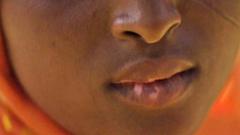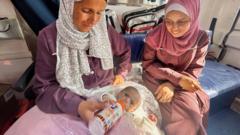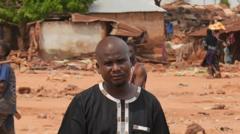Amidst the backdrop of societal preference for lighter skin tones, a mother's use of skin-whitening products on her six children has led to severe physical consequences and emotional distress. As attitudes towards beauty and skin tone come under scrutiny in Nigeria, experts call for greater awareness and action against harmful practices.
The Cost of Beauty: A Mother's Regret Over Skin-Lightening Practices in Nigeria

The Cost of Beauty: A Mother's Regret Over Skin-Lightening Practices in Nigeria
A mother from northern Nigeria discusses the damaging effects of skin-lightening creams on her children, sparking a conversation on beauty standards and societal pressures in the region.
A mother in northern Nigeria, known as Fatima, is grappling with the profound regret of having used skin-lightening creams on her six children, an act spurred by familial pressures and societal standards of beauty. As she clutches her two-year-old, who suffers from burns and skin discoloration, Fatima reflects on the irreversible damage inflicted upon her children and the discrimination they now face.
Fatima, 32, explains that her mother favored her sister's lighter-skinned children over hers, prompting her to seek skin-lightening solutions. Initially, the creams seemed to win her mother’s approval, but soon the adverse effects became evident—burns and scars emerged on her children, including her toddler, who still has open sores that are slow to heal.
The use of skin-whitening products is alarmingly widespread in Nigeria, where reports indicate that 77% of women engage in this practice, according to the World Health Organization (WHO). The creams often contain harmful ingredients like hydroquinone and mercury, leading to various health complications, including skin disorders and potential kidney damage. The Nigerian National Agency for Food and Drug Administration and Control (Nafdac) recently declared a public health emergency over the use of these products.
Zainab Bashir Yau, who runs a dermatology spa, notes that cosmetic discrimination drives many to bleach their skin. Women often fear that their darker-skinned children will face similar prejudice, leading to a disturbing trend where parents apply these harmful products to children as young as infants.
During a visit to a market in Kano, the prevalence of these creams is evident, with sellers mixing custom skin-lightening products before customers' eyes. Many buyers, including young girls, are oblivious to the risks, often seeking products labeled for infants despite regulations against their use on children.
Fatima's daughters, who have also been affected, face societal ridicule and prejudice, with some losing potential future partners due to misconceptions about their appearance. As they cope with the stigma, Fatima's regret deepens; her children’s injuries serve as a stark reminder of the pressures imposed by societal beauty ideals.
Despite attempts at public awareness about the dangers of skin-whitening creams, enforcement remains challenging. Dr. Leonard Omokpariola from Nafdac highlights ongoing efforts to educate the public and intercept harmful products crossing the borders. However, the clandestine nature of these substances complicates detection.
With her children's health deteriorating, Fatima has vowed to discourage other parents from making similar mistakes. She understands that her actions have lasting consequences and wishes to use her experience to foster a broader conversation about beauty standards and the risks associated with them.
As discussions of racial identity and beauty continue, Fatima’s story serves as a sobering reminder of the societal pressures that can lead to harmful choices and the urgent need for change in perceptions of beauty and health.




















